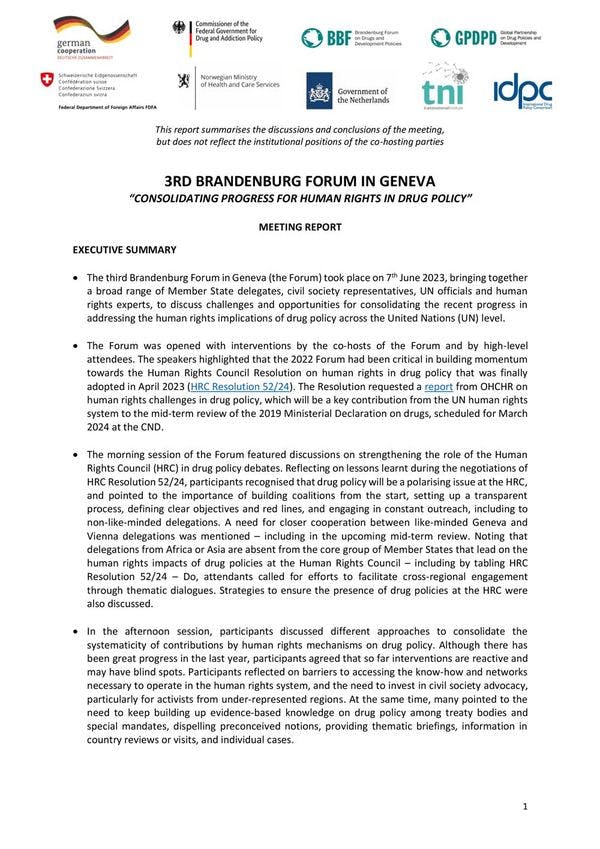3er Foro de Brandemburgo (BBF) en Ginebra: Consolidar el progreso de los derechos humanos en la política de drogas
Este informe resume los principales debates e intervenciones y da cuenta de las prioridades identificadas por los participantes. Más información, en inglés, está disponible abajo.
Executive summary
The third Brandenburg Forum in Geneva (the Forum) took place on 7th June 2023, bringing together a broad range of Member State delegates, civil society representatives, UN officials and human rights experts, to discuss challenges and opportunities for consolidating the recent progress in addressing the human rights implications of drug policy across the United Nations (UN) level.
The Forum was opened with interventions by the co-hosts of the Forum and by high-level attendees. The speakers highlighted that the 2022 Forum had been critical in building momentum towards the Human Rights Council Resolution on human rights in drug policy that was finally adopted in April 2023 (HRC Resolution 52/24). The Resolution requested a report from OHCHR on human rights challenges in drug policy, which will be a key contribution from the UN human rights system to the mid-term review of the 2019 Ministerial Declaration on drugs, scheduled for March 2024 at the CND.
The morning session of the Forum featured discussions on strengthening the role of the Human Rights Council (HRC) in drug policy debates. Reflecting on lessons learnt during the negotiations of HRC Resolution 52/24, participants recognised that drug policy will be a polarising issue at the HRC, and pointed to the importance of building coalitions from the start, setting up a transparent process, defining clear objectives and red lines, and engaging in constant outreach, including to non-like-minded delegations. A need for closer cooperation between like-minded Geneva and Vienna delegations was mentioned – including in the upcoming mid-term review. Noting that delegations from Africa or Asia are absent from the core group of Member States that lead on the human rights impacts of drug policies at the Human Rights Council – including by tabling HRC Resolution 52/24 – Do, attendants called for efforts to facilitate cross-regional engagement through thematic dialogues. Strategies to ensure the presence of drug policies at the HRC were also discussed.
In the afternoon session, participants discussed different approaches to consolidate the systematicity of contributions by human rights mechanisms on drug policy. Although there has been great progress in the last year, participants agreed that so far interventions are reactive and may have blind spots. Participants reflected on barriers to accessing the know-how and networks necessary to operate in the human rights system, and the need to invest in civil society advocacy, particularly for activists from under-represented regions. At the same time, many pointed to the need to keep building up evidence-based knowledge on drug policy among treaty bodies and special mandates, dispelling preconceived notions, providing thematic briefings, information in country reviews or visits, and individual cases.
Following the standard Brandenburg Forum methodology, after each panel participants were divided in four breakout groups to discuss and formulate concrete recommendations for the way forward. Each breakout group brought back to the plenary two recommendations. After a voting exercise at the end of the day, the top-voted priorities were:
Top-voted priorities on “strengthening the role of the Human Rights Council in drug policy”:
- Organise regional briefings to engage Member States in regional groups which may need support in establishing a human rights-based approach to drug policies, with a prior mapping of strategic themes and Member States, and involving regional stakeholders and civil society. (23 votes)
- Ensure widest dissemination possible of OHCHR report, including sharing it with national stakeholders, and OHCHR presenting the report at the Autumn 2023 CND intersessional, organising events a broad range of Member States and involving the UN system coordination Task Team on the Implementation of the UN System Common Position on drug-related matters. (20 votes).
- Mainstream drug policy language into relevant HRC resolutions, with prior mapping of issues, and influencing special mandates to integrate drug policy issues into their reports. (20 votes).
Top-voted priorities on “strengthening the role of the Human Rights Council in drug policy”:
- Promote a one-UN approach to drugs, including a stronger role for the Task Team, and consolidate cooperation between UNODC and OHCHR (examples: OHCHR input to World Drug Report, joint work plan, memoranda of understanding, etc.). (29 votes).
- Build on the core group, systematise recommendations on drug policies through the Universal Periodic Review. (25 votes).
